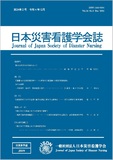Japanese
English
- 有料閲覧
- Abstract 文献概要
- 参考文献 Reference
要約
目的:研究目的は,平成28年(2016年)熊本地震(以後熊本地震とする)の急性期に第1陣として派遣された,近畿圏のDMAT(Disaster Medical Assistance Team)看護師が体験したことを明らかにすることである.
方法:調査期間は,2019年6月~9月であり,半構成的面接法により,熊本地震において近畿圏内から第1陣で出動した近畿圏内のDMAT看護師に体験を語ってもらった.分析には,質的帰納的分析方法を用いた.
結果:研究協力に同意が得られた研究対象者は6病院10人であった.逐語録から32のサブカテゴリー,12のカテゴリーを抽出した.
考察・結論:近畿圏のDMAT看護師は,発災と同時に準備に入り,現地に向かった.到着した時にはすでに急性期を脱しつつある現状であり,災害急性期のエキスパートとしてのスキルを発揮できないもどかしさを感じていた.現地のDMAT本部は,多くの支援団体が集結したことで混乱をきたし,他組織との協働も不十分であったことが語られた.それらの状況から,帰還後に不全感を感じていた.
Purpose: The purpose of the research was to clarify the experience of DMAT (Disaster Medical Assistance Team) nurses in the Kinki region who were dispatched as the first team during the acute phase of the 2016 Kumamoto earthquake.
Methods: The survey period was from June to September 2019. Using a semi-structured interview method, we asked Kinki area DMAT nurses who had been dispatched from the Kinki area to talk about their experiences during the Kumamoto earthquake. We used a qualitative inductive analysis method for the analysis.
Results: Ten subjects from six hospitals agreed to cooperate with this research. We extracted 32 subcategories-, and 13 categories from the verbatim records.
Discussion and conclusions: DMAT nurses in the Kinki region began preparations as soon as the disaster occurred and headed for the site. When the nurses arrived in the disaster area, the acute phase of the disaster had had been passing, and they felt frustrated that they could not demonstrate their skills as experts in the acute phase of the disaster. It was reported that the local DMAT headquarters was thrown into a state of confusion by the large number of support groups that had gathered there and that its cooperation with other organizations was insufficient. These circumstances caused the nurses to feel a sense of inadequacy upon their return.
Copyright © 2022, Japan Society of Disaster Nursing All rights reserved.


